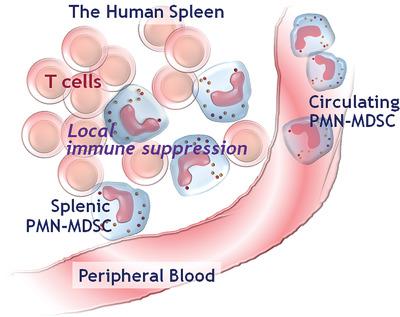当前位置:
X-MOL 学术
›
Eur. J. Immunol.
›
论文详情
Our official English website, www.x-mol.net, welcomes your
feedback! (Note: you will need to create a separate account there.)
Human splenic polymorphonuclear myeloid-derived suppressor cells (PMN-MDSC) are strategically located immune regulatory cells in cancer.
European Journal of Immunology ( IF 4.5 ) Pub Date : 2020-07-20 , DOI: 10.1002/eji.202048666 Ece Tavukcuoglu 1 , Utku Horzum 1 , Hamdullah Yanik 1 , Aysegul Uner 2 , Digdem Yoyen-Ermis 1 , Safa K Nural 3 , Busra Aydin 1, 4 , Cenk Sokmensuer 2 , Derya Karakoc 3, 4 , Kerim Bora Yilmaz 4, 5 , Erhan Hamaloglu 3, 4 , Gunes Esendagli 1, 4
European Journal of Immunology ( IF 4.5 ) Pub Date : 2020-07-20 , DOI: 10.1002/eji.202048666 Ece Tavukcuoglu 1 , Utku Horzum 1 , Hamdullah Yanik 1 , Aysegul Uner 2 , Digdem Yoyen-Ermis 1 , Safa K Nural 3 , Busra Aydin 1, 4 , Cenk Sokmensuer 2 , Derya Karakoc 3, 4 , Kerim Bora Yilmaz 4, 5 , Erhan Hamaloglu 3, 4 , Gunes Esendagli 1, 4
Affiliation

|
In contrast to the mouse, functional assets of polymorphonuclear myeloid‐derived suppressor cells (PMN‐MDSC) in the human spleen remain to be better elucidated. Here, we report that the spleen in gastric and pancreatic cancer adopts an immune regulatory character, harbors excessive amount of PMN‐MDSC, and anatomically enables their interaction with T cells. Compared to the peripheral blood, the spleen from cancer patients contained significantly higher levels of low‐density PMN‐MDSC, but not early‐stage MDSC (e‐MDSC) and monocytic‐MDSC (M‐MDSC). Low‐density fraction of polymorphonuclear (PMN) cells was enriched in immature myeloid cells and displayed higher levels of CD10, CD16, and ROS than their blood‐derived counterparts. They were also positive for PD‐L1, LOX‐1, and pSTAT3. The white pulp and periarteriolar lymphoid sheath (PALS) were strategically surrounded by PMN cells that were in contact with T cells. Unlike those from the blood, both low‐density and normal‐density PMN cells from the human spleen suppressed T cell proliferation and IFN‐γ production. Independent of clinical grade, high PMN‐MDSC percentages were associated with decreased survival in gastric cancer. In summary, our results outline the immune regulatory role of the spleen in cancer where neutrophils acquire MDSC functions and feasibly interact with T cells.
中文翻译:

人脾脏多形核髓源性抑制细胞(PMN-MDSC)是癌症中具有战略意义的免疫调节细胞。
与小鼠相反,人类脾脏中多形核髓样抑制细胞(PMN-MDSC)的功能资产仍有待更好地阐明。在这里,我们报道胃癌和胰腺癌的脾脏具有免疫调节特性,具有过量的PMN-MDSC,并且从解剖学角度使它们与T细胞相互作用。与外周血相比,癌症患者的脾脏中的低密度PMN-MDSC含量明显更高,但早期MDSC(e-MDSC)和单核MDSC(M-MDSC)含量不高。低密度级分的多形核细胞(PMN)富含未成熟的髓样细胞,并且其CD10,CD16和ROS的含量高于血液来源的对应物。它们对PD‐L1,LOX‐1和pSTAT3也呈阳性。白色牙髓和小动脉周围淋巴鞘(PALS)被与T细胞接触的PMN细胞策略性地包围。与血液中的那些不同,人脾中的低密度和正常密度的PMN细胞均抑制T细胞增殖和IFN-γ的产生。与临床等级无关,PMN-MDSC高百分比与胃癌生存期降低有关。总之,我们的研究结果概述了脾脏在癌症中的免疫调节作用,中性粒细胞具有MDSC功能并可能与T细胞相互作用。PMN-MDSC高百分比与胃癌生存期降低有关。总之,我们的研究结果概述了脾脏在癌症中的免疫调节作用,中性粒细胞具有MDSC功能并可能与T细胞相互作用。PMN-MDSC高百分比与胃癌生存期降低有关。总之,我们的研究结果概述了脾脏在癌症中的免疫调节作用,中性粒细胞具有MDSC功能并可能与T细胞相互作用。
更新日期:2020-07-20
中文翻译:

人脾脏多形核髓源性抑制细胞(PMN-MDSC)是癌症中具有战略意义的免疫调节细胞。
与小鼠相反,人类脾脏中多形核髓样抑制细胞(PMN-MDSC)的功能资产仍有待更好地阐明。在这里,我们报道胃癌和胰腺癌的脾脏具有免疫调节特性,具有过量的PMN-MDSC,并且从解剖学角度使它们与T细胞相互作用。与外周血相比,癌症患者的脾脏中的低密度PMN-MDSC含量明显更高,但早期MDSC(e-MDSC)和单核MDSC(M-MDSC)含量不高。低密度级分的多形核细胞(PMN)富含未成熟的髓样细胞,并且其CD10,CD16和ROS的含量高于血液来源的对应物。它们对PD‐L1,LOX‐1和pSTAT3也呈阳性。白色牙髓和小动脉周围淋巴鞘(PALS)被与T细胞接触的PMN细胞策略性地包围。与血液中的那些不同,人脾中的低密度和正常密度的PMN细胞均抑制T细胞增殖和IFN-γ的产生。与临床等级无关,PMN-MDSC高百分比与胃癌生存期降低有关。总之,我们的研究结果概述了脾脏在癌症中的免疫调节作用,中性粒细胞具有MDSC功能并可能与T细胞相互作用。PMN-MDSC高百分比与胃癌生存期降低有关。总之,我们的研究结果概述了脾脏在癌症中的免疫调节作用,中性粒细胞具有MDSC功能并可能与T细胞相互作用。PMN-MDSC高百分比与胃癌生存期降低有关。总之,我们的研究结果概述了脾脏在癌症中的免疫调节作用,中性粒细胞具有MDSC功能并可能与T细胞相互作用。











































 京公网安备 11010802027423号
京公网安备 11010802027423号